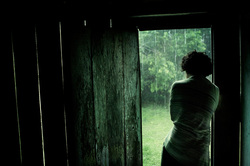- Meet Karla
- Free Guided Meditations
- Events & Workshops
- Get Your Free E-Book Breathing Lessons
- Work With Me
- Ketamine Assisted Psychotherapy (KAP)
- Reiki
- Tarot
- Chakras
- Yoga Nidra
- Frequently Asked Questions
- Just Breathe
- Altars and Shrines
- Tips & Articles
- Gift Certificates
- Press and News
- Blog: The Therapeutic Life
- The Mind in Grief
- Grounding
Grief and Bereavement

"Grief is a journey, often perilous and without clear direction, that must be taken. The experience of grieving cannot be ordered or categorized, hurried or controlled, pushed aside or ignored indefinitely. It is inevitable as breathing, as change, as love. It may be postponed, but it will not be denied." ~Molly Fumia
If you are here because you are grieving the loss of someone you love, I am so sorry. Times of grief are some of the hardest we ever have to deal with in our lives. Please know that you are not alone, even though it sometimes feels that way. There is nothing wrong with you, you are not crazy. Grief is not a disease or a pathological problem. Grief is a natural part of life. It is an incredibly difficult, painful, heart-breaking, chaotic time of life, but it is a part of life. Grief is never welcome, but is something we must all deal with at some point in our lives. If we love others and we live long enough, everyone will grieve.
Even though everyone grieves, it is important to realize that not everyone grieves in the same way. Each person's journey through grief is individual. There are as many ways to grieve as there are grieving people. In order to heal, we must fully experience our grief, find our own individual ways of grieving and mourning and then actively do those things that will help us to heal. The problem can often be that in the midst of grief, we don't even know where to start. It can be hard to see past the pain, to even begin to believe that we will be able to feel better. It can seem impossible that we may ever feel happiness again.
There is no time-table of healing from grief. Grief takes time. Everyone is different and your healing process may take months, years, even a life-time. This is not to say we never get better--we can and do. We must be prepared for and able to navigate those times when our grief returns, when we are faced with triggers (such as a favorite song on the radio, holidays or anniversaries), when we experience another loss. Learning how to manage grief is a skill and having the courage to face the pain and move through it helps us to be able to handle each successive loss we experience with grace and with the self assurance that we can survive it--even when it hurts.
When we have experienced a deep loss, we are confronted with not only the pain, but also with the task of rethinking our relationship with the one who has died. We need never let go of the love we have for those who have died. I do not believe in "saying goodbye," or "moving on." I believe that while we learn how to work through the pain of grief, we can learn how to continue our relationships with those we love who have died. We can move forward, through the pain, taking our love, our memories, and our new way of relating to our loved ones, along with us. Death may end a life, but does not end a relationship.
Learn about my new book Yoga for Grief and Loss.
If you are here because you are grieving the loss of someone you love, I am so sorry. Times of grief are some of the hardest we ever have to deal with in our lives. Please know that you are not alone, even though it sometimes feels that way. There is nothing wrong with you, you are not crazy. Grief is not a disease or a pathological problem. Grief is a natural part of life. It is an incredibly difficult, painful, heart-breaking, chaotic time of life, but it is a part of life. Grief is never welcome, but is something we must all deal with at some point in our lives. If we love others and we live long enough, everyone will grieve.
Even though everyone grieves, it is important to realize that not everyone grieves in the same way. Each person's journey through grief is individual. There are as many ways to grieve as there are grieving people. In order to heal, we must fully experience our grief, find our own individual ways of grieving and mourning and then actively do those things that will help us to heal. The problem can often be that in the midst of grief, we don't even know where to start. It can be hard to see past the pain, to even begin to believe that we will be able to feel better. It can seem impossible that we may ever feel happiness again.
There is no time-table of healing from grief. Grief takes time. Everyone is different and your healing process may take months, years, even a life-time. This is not to say we never get better--we can and do. We must be prepared for and able to navigate those times when our grief returns, when we are faced with triggers (such as a favorite song on the radio, holidays or anniversaries), when we experience another loss. Learning how to manage grief is a skill and having the courage to face the pain and move through it helps us to be able to handle each successive loss we experience with grace and with the self assurance that we can survive it--even when it hurts.
When we have experienced a deep loss, we are confronted with not only the pain, but also with the task of rethinking our relationship with the one who has died. We need never let go of the love we have for those who have died. I do not believe in "saying goodbye," or "moving on." I believe that while we learn how to work through the pain of grief, we can learn how to continue our relationships with those we love who have died. We can move forward, through the pain, taking our love, our memories, and our new way of relating to our loved ones, along with us. Death may end a life, but does not end a relationship.
Learn about my new book Yoga for Grief and Loss.
Grief really is, like so many of the books say, like waves.

Just as waves in the ocean come and go, moving in and receding, with high and low tides, sometimes smooth and calm, sometimes rough and choppy, ever-changing. Sometimes when you get hit by a big, powerful wave, there is nothing you can do but allow it to take you with it until it is over. If you struggle or fight it, it only makes things worse. Or it might be a little wave that just kind of knocks you off balance a bit; maybe you find yourself struggling to keep your balance in what seemed at first to be calm waters, digging your toes and feet down into the shifting sands, muscles of your back and legs tightening to in the struggle to keep your body upright. Perhaps the next wave may overpower you, cause you to fall down and scrape your knee on a sharp piece of shell or this time, the next might be an huge wave that comes up fast, seemingly out of nowhere, crashing down on you, knocking you sideways and under. You might feel scared, on the edge of panic, totally at the mercy of something much bigger and powerful than yourself. You might feel like you’re drowning, like you can’t breathe. Rolling over and over, seeing the light above, then dark murkiness, being pummeled and tossed about, maybe bruised and disoriented, until you are left to dry on the sand. The waves of grief are just like that, and just as unpredictable, except in that you know the waves will come. Only not how or when or whether they might be calm or rough. But also like the ocean, if you try to float with the waves of grief, relax as much as you can, and even more difficult, trust that you can float, it is a little easier. Only a little, but that is something. Trusting that you will able to float might save your life.
© Karla Helbert, MS, LPC All Rights Reserved
- Meet Karla
- Free Guided Meditations
- Events & Workshops
- Get Your Free E-Book Breathing Lessons
- Work With Me
- Ketamine Assisted Psychotherapy (KAP)
- Reiki
- Tarot
- Chakras
- Yoga Nidra
- Frequently Asked Questions
- Just Breathe
- Altars and Shrines
- Tips & Articles
- Gift Certificates
- Press and News
- Blog: The Therapeutic Life
- The Mind in Grief
- Grounding